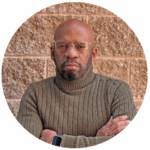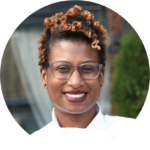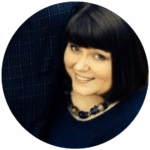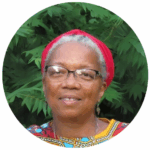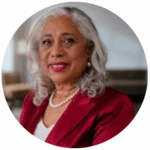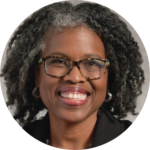Speakers and Sessions
Friday, June 6
Awards Ceremony
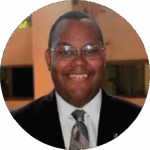
Jari Honora
Keynote Speaker
Jari C. Honora, a Certified Genealogist®, is a New Orleans native and proud Louisiana Creole with roots dating back more than two centuries along Bayou Lafourche and the German-Acadian Coast. He is a graduate of St. Augustine High School and Tulane University. He works as Family Historian in the Williams Research Center of the Historic New Orleans Collection. He previously worked for Le Musée de f.p.c. and taught in local charter schools. He also does historical and genealogical research professionally, including the TV programs “Finding Your Roots” “We’ll Meet Again,” and the Georgetown Memory Project. He has presented at numerous historical and genealogical conferences including the International Black Genealogy Summit; American Educational Research Association; Southern Historical Society; Afro-American Historical & Genealogical Society (AAHGS); and the Canadian Society for Eighteenth Century Studies. As one of four contributors to the CreoleGen blog, he regularly shares research findings on Louisiana Creole people and institutions.
Saturday, June 7
9th Annual Conference
Strategies for Writing Engaging Stories about Our Ancestors
Sometimes our research uncovers notable people and events. On other occasions we might say our ancestors were just everyday people. Nevertheless, there is usually an intriguing journey that takes us from the present to the past, and very often there are findings to share. How do we translate our findings into compelling essays that others will enjoy reading? In this session Guy will share how writers can use both fascinating and mundane details of family history to create interesting stories. He will also discuss how Artificial Intelligence (AI) has been helpful recently without infringing on the authenticity of his work, as well as discussing publication opportunities.
Golden Fields Salad: A Taste of Lowcountry Heritage
A vibrant and hearty salad inspired by the Gullah Geechee culinary tradition, featuring heirloom Carolina Gold rice (or brown rice), charred okra, sweet corn, greens, and a citrus-herb vinaigrette. This dish pays tribute to the agricultural expertise of enslaved African ancestors and their contributions to Southern foodways.
Breakout Session A
10:30am-11:30am
SESSION
DESCRIPTION
Session: What if…You Must Formally Prove Your Lineage to Your Enslaved Ancestor?
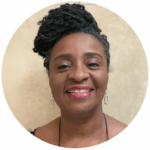
DELBRA BROWN
This session will guide participants through the process of leveraging DNA matches to identify unknown ancestors. It will cover key concepts such as understanding shared DNA, analyzing relationship patterns, and utilizing genealogy tools to map family connections. Participants will learn practical strategies for organizing DNA match data, cross-referencing historical records, and forming hypotheses about missing ancestors. By the end of the session, attendees will have a structured approach to using genetic genealogy in their research.
This live session will be a hands-on FamilySearch experience with guidance in setting up free accounts, navigating through historical context, and platform-specific research strategies/tools. The group will be using the Research Wiki’s State-by-State research guides for pre-1870 U.S Census resources, and best practices for adding documentation for enslaved persons and attaching/correcting individuals and sources to FamilySearch Family Tree.
Please arrive with any FamilySearch questions you may have and the birth/death dates for your most recently deceased ancestor(s) if you wish to attach your family into the shared FS Family Tree.
Breakout Session B
1:30pm-2:30pm
Black US Naval Prisoners of the War of 1812, including my triple great-grandfather John Macklin, were held on ships like HMS Ganges and later at Dartmoor Prison in England. At Dartmoor, Black prisoners in Block 4 elected Richard Crafus, known as “King Dick,” to lead them. Block 4 became the center of social and economic life, featuring theater, boxing, a preacher, and even a smuggled roulette wheel. After the Treaty of Ghent, many Black men delayed returning to the US, fearing re-enslavement. Over 38 years later, Black and White veterans were honored together at a War of 1812 veterans’ convention in Washington, DC.
Genealogist Ruth Hunt shares her transformative experience of discovering her enslaved ancestors by physically visiting the land where they once lived. In this powerful session, she recounts how walking the same ground—meeting local residents, historians, and community elders—led her to records, oral histories, and connections that she would never have found online. This presentation highlights the often-overlooked importance of place-based research and how ancestral landscapes can hold the keys to long-buried truths. Whether you’re just beginning your search or facing brick walls in your family history, Ruth’s story will inspire you to follow the footsteps of your ancestors—right to the soil that shaped their lives.
Discover how to transform historical records into powerful family narratives using artificial intelligence. In this interactive session, Dr. Evelyn McDowell will guide participants through the process of using AI tools like ChatGPT to draft meaningful stories rooted in genealogical facts. Whether you’re just beginning your family history journey or have years of research, you’ll learn how to craft effective prompts, enrich stories with historical context, and explore ethical storytelling. Attendees will also participate in a hands-on breakout room activity to practice writing their own AI-assisted story drafts.
Breakout Session C
1:30pm-2:30pm
What If…You Must Formally Prove Your Lineage to Your Enslaved Ancestor?
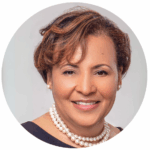
JONNIE RAMSEY BROWN
The objectives of this session are to explore the importance of lineage organizations and the benefits of joining them, with a particular emphasis on the Sons & Daughters of the U.S. Middle Passage. Participants will engage in hands-on activities focused on documenting the first three generations of their lineage using vital records, with sample data provided. Additionally, the session will offer practical experience in writing clear and concise explanations to address discrepancies found in historical documents, supported by sample scenarios.
Were There “Skeeters” in the Great Dismal Swamp? An Examination of Maroon Communities in the Diaspora.
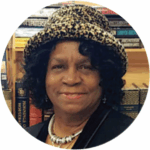
GIGI BEST-RICHARDSON
We will delve into the life, trials, and tribulations of the African Diaspora Maroon Communities. Understanding that the maroon spirit of resistance and self-determination was the impetus that forced runaway, enslaved, free people of color, and indigenous peoples to escape by entering into isolated communities. However, many of these communities were very dangerous because of their physical environments and the constant pursuit of the occupants. Maroons hid by living in neighborhoods from the Colonial times, like the Great Dismal Swamp in North Carolina and Virginia (where my ancestors lived), and Fort Mose in Florida. Maroon communities also existed in Haiti, Brazil, Colombia, Belize, and other places in the Americas, and Maroon settlements in Jamaica have survived to today.
Biographies
Guy Weston’s current activities encompass research and public history initiatives to raise the profile of Timbuctoo, NJ, where his fourth great grandfather purchased land in 1829. These have included interpretive signage in Timbuctoo, coordination of a curriculum development project in collaboration with local teachers, and preservation efforts for the Timbuctoo cemetery, where the oldest gravestone is dated 1847. He currently serves as Managing Director of the Timbuctoo Historical Society and is a Visiting Scholar at Rutgers University. He has contributed articles to Afro American Historical and Genealogical Society (AAHGS) Journal, AAHGS News, National Genealogical Society Magazine, and New Jersey Studies. He maintains a website atwww.timbuctoonj.com .
Chef Keesha O’ Galdez is a personal chef. She has completed the Chef’s training program at the Natural Gourmet Institute for Culinary Arts in New York City. Focusing on organic, vegetarian, vegan, and other health-supportive diets. She also has a BS in Information Systems Engineering from Buffalo University—SUNY and an MBA from Simmons College in Boston, MA. Worked in the non-profit, academic, public, and financial sectors as a project consultant and operations manager. She has graced the kitchens as a Pastry Chef at Smith Canteen in Carroll Gardens, Brooklyn, Amy’s Bread and Smile to Go in Soho, and Savory as a catering chef at Patina Events. You may have seen Chef Keesha on multiple episodes of Epicurious’s 50 Person Prep challenge web series that has reached over 10 million views and Food Network’s Chopped.
Delbra Brown has been conducting genealogical research for over 35 years, self-teaching her way through online resources to uncover the history of her family. Her maternal roots trace back to Bullock and Macon Counties in Alabama, while her paternal lineage originates from Jamaica. Professionally, Delbra works as an automation test engineer in the IT industry; however, her true passion lies in genealogy, particularly in uncovering the stories of her ancestors lost due to the legacies of slavery. Through her research, Delbra has successfully validated many of the oral histories shared by her grandmother, and she is now dedicated to tracing the lineage of her enslaved ancestors. During the 2019 COVID-19 pandemic, she published several books documenting her family’s history, with each chapter focusing on a different ancestor and presented in a narrative style that captures the essence of southern dialect. Additionally, she transformed one of her published works into a documentary. Today, Delbra is committed to sharing the knowledge she has gained throughout her genealogical journey. She is passionate about helping others break through their own research brick walls and discover their ancestral connections.
Carol Parmley has over thirty years of experience in family history research as a volunteer, student, FamilySearch Center Consultant/Director, and a genealogist doing business as The Ancestral Guardian. She specializes in U.S. Southern States research and enjoys mentoring and motivational speaking on a variety of genealogical subjects.
Benita Law-Diao As the self-appointed family historian since the age of 10, Benita found researching her family history has given her strength and drive to venture into places and spaces that have made her life richer. Over the years, Benita continued her quest to learn about her family and formerly enslaved people of the Black Diaspora, so that she can share this history in the Black community in order to fortify them. Benita is an Advisor for the Harriet Tubman NYS Underground Railroad Byway, which will eventually be part of a contiguous historic byway from Maryland to St. Catharine’s, Ontario, Canada. As a Board Member for John Brown Lives! (JBL!), a nonprofit freedom education and human rights organization, the John Brown Lives uses arts and education, advocacy and activism to engage the public in excavating useful legacies of the past in order to inspire community and civic action that addresses critical social justice issues today. As the Leader for Outdoor Afro-Albany and Upstate NY, Benita works to connect and re-connect Black people to nature through planned and guided outdoor adventures. She shares her outdoor expertise, knowledge of civics and history, and love for nature with participants in various activities like foraging, fishing, kayaking, gardening, and skiing. Additionally, she hosts monthly events, participates in stewardship and conservation efforts, and promotes Outdoor Afro’s mission through various channels. For the past 4 years, as a Trustee of the Adirondack Experience Museum, http://www.theadkx.org, Benita has been bringing busloads of African Americans to the museum to teach them about the little known history of free African Americans who settled in the Adirondacks in the 1800s to the present. She and others have worked to secure $2M from the NYS Legislature to create an African American history gallery that will open at the Adirondack Experience Museum July 4, 2027, during the 200th anniversary of the legal abolition of slavery in New York State.
Ruth D. Hunt is a seasoned family historian and genealogist. In 1977 she was inspired by the Godfather Alex Haley and has been researching family history ever since. She has developed research skills that produced miraculous results believed to be gifts from her ancestors. One of her greatest accomplishments was finding her long-lost WWII half-brother in England. She lectures and provides genealogical workshops for numerous organizations, libraries, and civic groups. Ms. Hunt most recently developed a genealogy workshop program for the New York City Veterans, New York City Health + Hospital Corporation Inclusion Group, and the Roanoke Virginia Daughters of the American Revolution. A few of Ms. Hunt’s affiliations are she is a Charter Member of The Sons and Daughters of the United States Middle Passage. She has been a member of The Afro-American Historical and Genealogical Society since the 1980s. Ms. Hunt has been a member of the DAR since 2009, and she holds a certificate in Genealogical Research from the National Society Daughters of American Revolutions and was awarded a Lifetime Achievement Award from the United States Department of Defense for her work with Veterans
Dr. Evelyn Aniton McDowell, Ph.D., CPA, CGMA is the President of the Board of Directors and founder of Sons and Daughters of the United States Middle Passage. She is also an Associate Professor of Accounting at Rider University in Lawrenceville, NJ. She received her Bachelor of Arts in Business Administration from Baldwin-Wallace College, and her Master of Accountancy and Doctor of Philosophy in Accountancy from Case Western Reserve University in Cleveland, OH. She is the Program Director and co-founder of the Aspiring Accounting Professionals Program, an organization devoted to increasing the number of minority accounting professionals through mentoring, community involvement, experiential learning, and academic and peer support.
Dr. McDowell was born and raised in Cleveland, Ohio. In her spare time, she researches her family’s genealogy and is a member of the Princeton, NJ Chapter of the Daughters of the American Revolution. She is currently searching the following surnames: Polk, Aniton, Anderton, Blakeley (Alabama); Passmore, Colbert, and Jolly (Georgia).
Jonnie Ramsey Brown, an award-winning writer, has traced her family back to slavery, the American Revolution and beyond. She is the family historian and storyteller and holds membership in the Sons & Daughters of the US Middle Passage, Daughters of the American Revolution, First Families of Alabama and several other lineage organizations. Recently, Jonnie wrote a book to bring awareness of racial disparities in healthcare, in honor of the legacy of her late husband, Thomas James Brown. She currently resides in the Los Angeles area and is pursuing the adaptation of her book to film.
Gigi Best-Richardson is a Co-Owner, Curator, and Docent of Best Richardson African Diaspora Literature and Culture Nonprofit Museum. An Antiquarian bookseller co-owner since 1997, she is a member of the Association of African American Museums, Florida Antiquarian Booksellers Association, Afro-American Historical and Genealogical Society, and a Presenter on the Rare Book Café. She is a Historian (Phi Alpha Theta), Genealogist, Speaker, Poet, and a Virginia Humanities Scholar. Gigi is an award-winning author of “Thomas the Melungeon: His Locust Family of Free Persons of Color, Vol 1” and a contributor to the Inaugural Edition of the SOFAFEA Journal. She attended Morgan State University’s Graduate Literature Program. Gigi is a board member of several national hereditary societies, a Historian General of the Society of First African Families of English America, and a board member of Sons and Daughters United States Middle Passage. She is also a member of the Society of the Order of First Families of North Carolina; Daughters of the American Revolution; Colonial Dames 17th Century; New England Women; National Society Daughters of Founders and Patriots of America; Colonial Dames of America; and Daughters of the Union Veterans of the Civil War.
